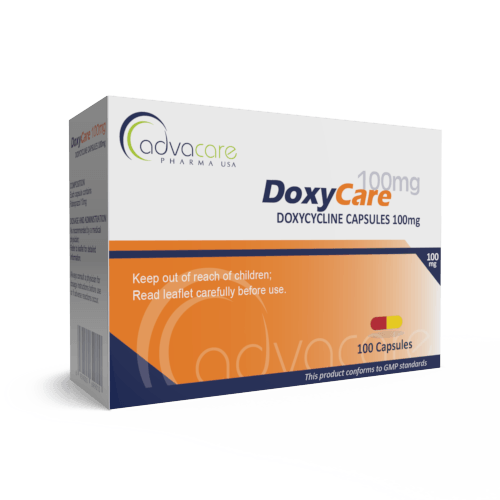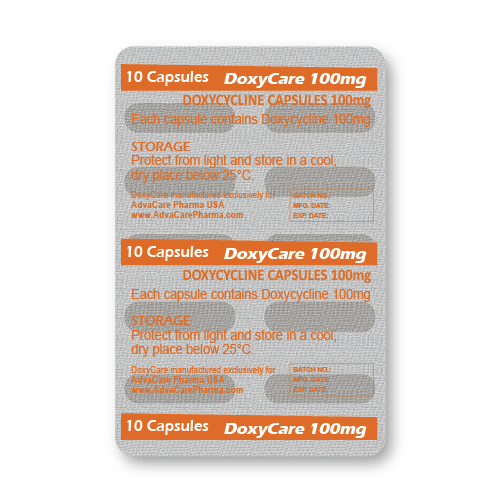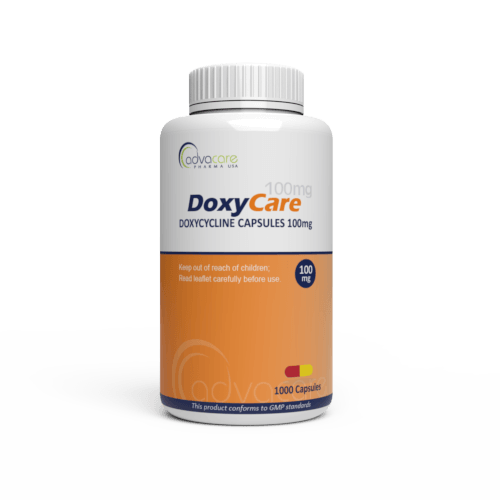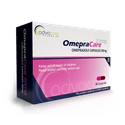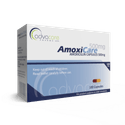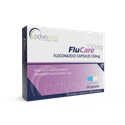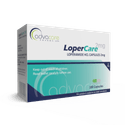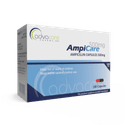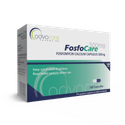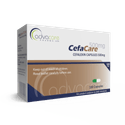- Home›
- Pharmaceuticals›
- Capsules›
- Doxycycline Capsules
Doxycycline Capsules
Dosage
Packaging
What is Doxycycline?
Active Ingredients: Doxycycline
Doxycycline Capsules are a drug used to treat many different types of bacterial infections, such as those of the skin, eyes, and respiratory system. This medication is also indicated for the treatment of acne-like lesions associated with rosacea. Doxycycline may also be used for malaria prevention.
Doxycycline is also indicated as a treatment for some types of zoonotic diseases, such as plague and tularemia. This medicine will not treat a viral infection such as the common cold or flu.
Doxycycline is a tetracycline antibiotic that fights bacteria in the body. The active ingredient works by inhibiting the first stage of protein synthesis in the bacterial cell wall. Doxycycline is effective against many Gram-positive and Gram-negative bacteria.
This product represents a broad-spectrum antibiotic that is synthetically derived from oxytetracycline. It is a second-generation tetracycline and it was first discovered in 1967. This generation of tetracyclines leads to less toxicity than the first generation. It has bacteriostatic properties and is a highly lipophilic drug that crosses multiple membranes of target molecules. This antibiotic also has antiparasitic and anti-inflammatory properties (against bullous dermatoses and rosacea).
Its mechanism of action is by binding to the 30S prokaryotic ribosomal subunit and by inhibiting the elongation phase of protein synthesis. It also inhibits the production of essential proteins for bacterial survival and functioning. Its anti-inflammatory properties function by preventing calcium-dependent microtubular assembly and lymphocytic proliferation. After oral administration, it is completely absorbed and has a bioavailability range from 73% to 95%. Tetracyclines bind to plasma proteins in varying degrees. This antibiotic is concentrated in bile by the liver and excreted in the urine and feces at high concentrations and in a biologically active form. The excretion by the kidney is about 40% over 72 hours in individuals with a creatinine clearance of about 75ml/min. This might fall as low as 1-5% over 72 hours in individuals with a creatinine clearance below 10ml/min.
This antibiotic is also available in tablet form.
AdvaCare Pharma is a trusted global exporter of Doxycycline Capsules. This medication is produced in our facilities in China, India, and the USA. Our manufacturing facilities are GMP-certified and are regularly inspected in order to ensure they meet health, safety, and environmental standards.
Why are we a quality Doxycycline manufacturer?
AdvaCare Pharma is a GMP manufacturer of Doxycycline Capsules. Our strategically located facilities ensure that our company has complete control over the supply chain, meaning higher quality products and lower costs for transportation and importation. Over the past 20 years, we have built a solid reputation as a leading manufacturer of pharmaceutical products across 65 countries.
Uses
What is Doxycycline used for?
Doxycycline is used to treat various types of bacterial infections, such as:
- skin infections, like acne
- respiratory infections, such as pneumonia or bronchitis
- eye infections
- infections in the lymphatic, intestinal, genital, or urinary systems
- dental infections, like periodontitis
- infections caused by ticks, lice, and mites
- plague
- tularemia
- some types of food poisoning in people who cannot tolerate penicillin
Doxycycline is also used to treat some symptoms caused by rosacea and prevent malaria for those who are traveling to high-risk areas.
How should Doxycycline Capsules be used?
This medication is manufactured to be taken orally, Doxycycline Capsules should be taken with a glass of water. Do not crush or chew the capsules. This antibiotic should be taken every 12 hours, depending on the specific needs and the prescribed dosage.
Patients who take this antibiotic might feel better before they complete the therapy, however, the therapy should be completely taken for full effectiveness of the treatment.
What dose should be taken?
The usual dose for adults is 200mg every 12 hours on the first day, then 100mg per day thereafter.
The dosage is based on medical condition, response to the treatment, age, and weight. Refer to a doctor or pharmacist for guidelines on dosage. Do not exceed what they advise.
What are the therapeutic indications of Doxycycline Capsules?
This antibiotic is effective against many Gram-positive and Gram-negative bacteria. It can be used for treating respiratory tract infections like chronic bronchitis and sinusitis.
Doxycycline is also effective against strains of Klebsiella species, Enterobacter species, Escherichia coli, Streptococcus faecalis, and other organisms that affect the urinary tract.
It is used to treat various infections, including STDs such as Chlamydia, non-gonococcal urethritis, chancroid, granuloma inguinale, lymphogranuloma venereum, and as an alternative for gonorrhea and syphilis. It is also effective for acne vulgaris, certain ophthalmic infections, rickettsial infections like Rocky Mountain spotted fever and Q fever, and other infections like psittacosis, brucellosis, and cholera. Doxycycline is also used for the prophylaxis of scrub typhus, traveler's diarrhea, leptospirosis, and malaria.
Consult with a healthcare professional to provide instructions on the dosage and the proper way of using this antibiotic.
Who can use Doxycycline Capsules?
Doxycycline can be administered to adults and children, but caution is advised for specific groups of patients.
Pregnant This antibiotic should not be given to pregnant or breastfeeding women. It can lead to side effects regarding skeletal development and it can also lead to teeth coloring.
Breastfeeding This product should not be given to nursing mothers because it is excreted into milk and there are contraindications for both the mother and the baby.
Pediatric Drugs from this class should not be given to kids younger than the age of 8 years during tooth development because it can lead to permanent discoloration (yellow-grey-brown teeth). It can occur during both long-term usage or repeated short-term courses. It can also lead to enamel hypoplasia. This antibiotic, when given to pediatric patients, often leads to more side effects than benefits. It should be given only if the use of other antibiotics is not effective or contraindicated.
Geriatric Doxycycline should be given in geriatric patients only if their liver and kidney function is normal. The excretion by the kidneys is about 40% over 72 hours in individuals with normal renal function, but it may fall to a range as low as 1-5% over 72 hours in individuals with severe renal insufficiency (creatinine clearance below 10ml/min).
Can viral infections be treated with Doxycycline?
No, this drug is an antibiotic, however, it can be used to prevent secondary bacterial infections in cases of viral diseases. The use of antibiotics during viral infections should be justified and approved by a healthcare professional.
Other warnings
Do not take this drug if you are allergic to any tetracycline antibiotics.
All antibiotics are associated with Clostridium difficile-associated diarrhea (CDAD). Antibacterial agents alter the colon flora, which can lead to the overgrowth of C. difficile. This condition can lead from mild diarrhea to fatal colitis. If you notice some symptoms, inform a doctor.
Side Effects
As with all pharmaceuticals, some unwanted effects can occur from the use of Doxycycline Capsules.
Common side effects include, but may not be limited to:
- diarrhea, nausea, and vomiting
- loss of appetite
- dizziness
- headache
- skin sensitivity to the sun
Seek urgent medical attention if the following develop:
- allergic reaction
- severe or bloody diarrhea
- stomach pain or cramps
- fever
- dehydration
- weight loss
- severe headache
- blurred or double vision
- vision loss
- chest pain
- anemia
For a comprehensive understanding of all potential side effects, consult a medical professional.
If any symptoms persist or worsen, or you notice any other symptoms, please call your doctor immediately.
Precautions
Do NOT use Doxycycline Capsules if:
- You are allergic to Doxycycline or any other of the ingredients.
- You have had liver or kidney disease.
- You have a sulfonamide allergy.
- You are pregnant or planning to become pregnant.
Doxycycline during pregnancy or in babies or children up to 8 years of age can cause the teeth to become permanently stained. It can also cause problems with bone growth. This antibiotic should never be given to children under 8 years of age except for inhalational anthrax, Rocky Mountain spotted fever, or if the healthcare professional decides it.
This antibiotic may not be suitable for people with certain conditions, so it is important to consult with a doctor if you have any health issues. Patients should inform their doctors about any prescribed or unprescribed drugs they are taking at the moment.
Supplements that contain magnesium, aluminum, or calcium, iron products, and laxatives containing magnesium might interfere with doxycycline and make it less effective. Patients should take doxycycline 1–2 hours before or 1–2 hours after taking these supplements.
This antibiotic might decrease the effectiveness of hormonal contraceptives (birth control pills, patches, rings, or injections). Patients should inform their doctors about any hormonal contraceptives they are using at the moment.
Patients should stay away from sunlight if they are taking Doxycycline because it makes the skin sensitive.
If a dose is skipped, the patient should proceed to the next scheduled dose.
Alcohol should not be consumed during Doxycycline treatment.
Possible interactions may occur with other pharmaceutical products. Consult with a doctor or pharmacist about any medications you are taking before beginning treatment.
References
Two randomized phase III clinical trials evaluating anti-inflammatory dose doxycycline (40-mg doxycycline, USP capsules) administered once daily for treatment of rosacea
The objective of this study was to evaluate the efficacy and safety of a once-daily dose of doxycycline for the treatment of rosacea.
It is a two-phase III, parallel-group, multicenter, randomized, double-blind, placebo-controlled studies in which patients received 40mg of controlled-release doxycycline (269 patients) or placebo (268 patients) for 16 weeks. The primary parameters that were measured were mean changes from baseline in facial inflammatory lesion count.
The initial lesion count averaged around 20 in both study groups. By week 16, the active-treatment groups in studies showed a mean reduction of -11.8 and -9.5 lesions from baseline, respectively, compared to -5.9 and -4.3 in the placebo groups (both comparisons P < .001). The anti-inflammatory dose of doxycycline was generally well tolerated, with the most frequent adverse events being nasopharyngitis (4.8%), diarrhea (4.4%), and headache (4.4%).
The findings from this study indicate that a once-daily anti-inflammatory dose of doxycycline appears to be effective and safe for the treatment of rosacea.

You might be interested in...
Why AdvaCare Pharma?
As an industry leader, we are aware of our responsibility to provide affordable and sustainable solutions to improve healthcare worldwide.
